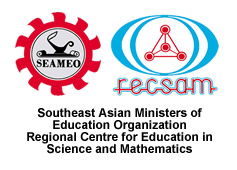Editorial Board (Issue 6 - 2011)
Azian T.S. Abdullah, PhD (Advisor)
Devadason Robert Peter (Chief Editor)
Ng Khar Thoe
Julito C. Aligaen
Kanageswary Suppiah, PhD
Corrienna Hj Abdul Talib
Cheah Ui Hock, PhD
Hazura Ab Bakar, PhD
Sheila Oyao, PhD
Contents
1. Developing Fraction Sense using Virtual Manipulatives (pp 1 – 9)
Ronny Kwan Eu Leong
Learning fractions has been one of the challenges for many students in elementary mathematics. This study was carried out to see how students’ informal knowledge and prior knowledge influence their conceptual meaning of fraction when they used virtual fraction manipulative for learning. Virtual manipulative tools were used as they are regarded as essential cognitive technological tools. A clinical interview was employed as a form of assessment of thinking. It was used at the beginning of the lesson to gauge the student's existing ideas on fractions. The instructional method involved interactions between the teacher and the students while solving fractions tasks. Finally, a closing interview was conducted to evaluate whether the lesson promoted the student's understanding of fractions. The researcher achieved most of the goals for this lesson. In addition, the lesson using virtual manipulative was fairly effective in promoting the conceptual knowledge of fractions.
2. An Insight of the Mathematics Education in India: Observations from Classrooms (pp 10 – 19)
Ronny Kwan Eu Leong & Lay Chin Tan
This paper provides an insight into mathematics education in India focusing on primary schools, high schools and colleges. The study also focuses on observation on mathematics classrooms of schools in the Mumbai region, schools in Jodphur and a college in Rajasthan. It also provides snapshots of mathematics classes in the primary and secondary levels that reflect the implementation of the National Curriculum Framework in India. Teachers’ pedagogical approach and students learning approach are discussed. One of the interesting observations was that the classrooms were teacher-centred that valued drill and practice skills. A brief description of the selection and objectives of the Indian Institute of Technology (IIT) is also provided. Teacher-preparation programmes are also discussed. Nevertheless, despite India having a centralized school system, it still has difficulty serving the needs of all students, especially in the rural areas.
Nur Jahan Ahmad
This paper describes students’ conceptual understanding with regards to the chemical reactions that occur in the electrolytic cell. The chemical reactions at the electrodes in the electrolytic cell are less emphasized in educational research in comparison to the voltaic cell. Some empirical evidence on 16-year-old secondary school students’ conceptual understanding of chemical reaction is presented. This study involved eight science classes in eight different schools (convenience samples) in Penang. The results show that most students in this study have difficulties in generating details on the chemical reactions that take place at the electrodes in the electrolytic cell. This may be due to students’ inability to make connections on the relationship between macroscopic, sub-microscopic, and symbolic entities.
Ng Khar Thoe, Kim Phaik Lah, Linda Toh, Francilyn A. Obrien, Sheila Oyao, Hazura Abu Bakar & Julito C. Aligaen
The ‘Search for SEAMEO Young Scientists’ (SSYS) is a biennially organized regional congress since 1997. It provides a platform or venue for intellectual and social interactions among student delegates and educators in the SEAMEO countries and beyond. ‘Magnificent Advancement for Young Scientists’ (MAAYS) is the international education flagship programme founded in 2003 by Vision Academy (M) Sdn. Bhd. Since the end of 2005, MAAYS.net e-research platform has been supporting the organization of the 5th SSYS (2006) and subsequent congresses mainly through e-learning networking activities. This article reports the second series of activities with evidence of exemplary practices in SEARCH for youth science and mathematics researchers over the past seven years. These were implemented by the authors as founders, webmasters, event organizers, advisors, facilitators and bloggers or e-forum participants. Some main features of MAAYS that promote student-centred learning supported using ICT [e.g. project-based activities (PBA)] with threaded discussion topics that are directly and indirectly related to science and mathematics learning are highlighted. Educational implications on how Web 2.0 plays the role in science/mathematics/technology/environmental education to promote awareness and enhance 21st-century skills are deliberated, with future direction elaborated.

